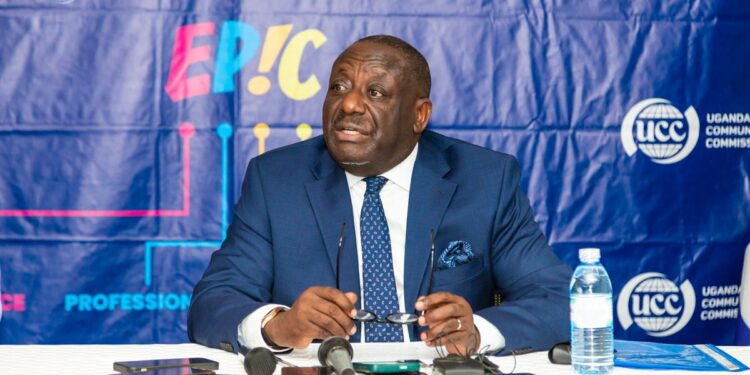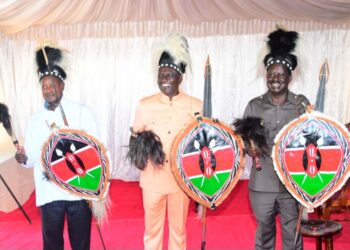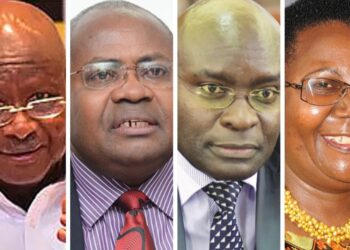The Uganda Communications Commission (UCC) Executive Director, Nyombi Thembo, has announced that broadcasters who continue to air inappropriate content could face fines of up to 10% of their annual gross revenue, along with other penalties.
While addressing the media on Thursday at UCC headquarters in Bugoolobi, Nyombi linked the spread of immoral media content to the collapse of societal values and warned that immediate action would follow to protect Uganda’s cultural and moral fabric.
“The biblical legend has it that whole cities have been destroyed. You remember Sodom and Gomorrah,” Nyombi began, referring to historical precedents of moral decay leading to destruction. He emphasized that while these are spiritual lessons, they hold deep meaning for the governance of society today. “A community, a country, that doesn’t follow the rules it has set, is poised for anarchy.”
Nyombi’s warning was clear that the UCC is mobilizing its resources to enforce existing laws and regulations. “We are a statutory entity to implement the law, and we shall do it to the letter,” he assured. He reiterated the media’s role as a custodian of public airwaves, emphasizing that these resources belong to Ugandans, not to be misused by broadcasters.
The UCC’s decision to intensify enforcement follows years of warnings and unheeded directives. Nyombi cited the increasing prevalence of sexually explicit content, indecent performances, and suggestive music videos across Uganda’s media platforms as major violations of the Uganda Communications Act (2013) and the Uganda Communication Content Regulation (2019).
“Offensive, obscene, indecent, and distressing material has no place in our broadcasting industry,” he declared. He singled out music videos as a new hiding place for such content, calling for strict classification of all media before airing. “Make sure before you broadcast these, they pass through the Media Council for classification.”
Fines, License Revocations, and Maximum Penalties:
In a significant move, the former Minister also warned broadcasters that UCC would impose fines of up to 10% of their annual gross revenue for non-compliance. “You are about to see these invoices coming,” he said. “We are going for maximum fines and revocation of licenses. We have talked and suspended, but it seems the problem is persisting.”
He added that the UCC would not hesitate to enforce the law to its fullest extent, pointing out that the commission has all the necessary tools to calculate fines and act swiftly. “This is something we don’t want to do, but we shall be pleased to do it for the good of our country.”
He reiterated the importance of preserving Uganda’s cultural values, comparing the nation’s journey to countries like China that have anchored their development in strong cultural identities. “A country without culture is doomed to collapse,” he stressed, adding that protecting Uganda’s youth from harmful content is central to the commission’s mission.
“We must ensure that our children are not abused,” he said, pointing to international examples of moral protection, such as keeping alcohol out of children’s reach in supermarkets. “Why should we put offensive mature content in the face of our children?”
The delicate balance of regulating while not infringing the press freedom and freedom of expression
Nyombi also highlighted the complexities of regulating media content without infringing on press freedom and freedom of expression. He emphasized the fine line the commission must walk to maintain this balance.
“Regulation is essential in any society,” Thembo stated. “We must protect public morality, our cultural values, and the rights of all Ugandans, especially our children. But at the same time, we recognize that freedom of expression and press freedom are pillars of democracy that must be preserved.”
He acknowledged the challenge regulators face, where over-regulation could suppress creativity and hinder the press from fulfilling its critical role in society. “We are not here to silence anyone,” he said. “Our role is to create an environment where broadcasters can thrive while ensuring that the content they air is responsible and adheres to the legal frameworks that protect the public.”
He pointed out that the UCC’s regulations are designed to strike a balance between protecting citizens from harmful content and respecting the rights of media practitioners. “The laws we enforce were created by Parliament, representing the people of Uganda. Our mandate is to ensure compliance, not to stifle freedom. And I’m very sure there is no law in our constitution when implemented will infringe on the rights to freedom of expression or press freedom,” he explained
“The talking has stopped. The only thing you will see tomorrow will be action.” With heavy fines, suspension, and license revocation now on the table,
Do you have a story in your community or an opinion to share with us: Email us at editorial@watchdoguganda.com













